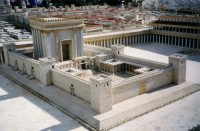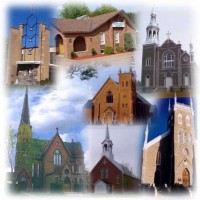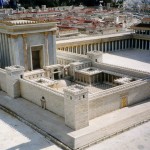 In the days of Jesus, the Jewish people believed in a form of incarnation. They did not believe that God could become a man, but that heaven and earth connected at the Temple in Jerusalem. God, for the Jewish person, dwelled in some sense in the temple. The temple was seen as the central incarnational symbol of Jewish life.
In the days of Jesus, the Jewish people believed in a form of incarnation. They did not believe that God could become a man, but that heaven and earth connected at the Temple in Jerusalem. God, for the Jewish person, dwelled in some sense in the temple. The temple was seen as the central incarnational symbol of Jewish life.
The Incarnation of the Temple
This is one of the primary reasons that the teachings and actions of Jesus were so controversial. In many different ways and at many different times, Jesus indicated that He was the new temple; that in Him people could receive forgiveness from sins, access to God, and restoration from exile. When people believe that God is in the temple, imagine what a shock it would have been for Jesus to announce that the Temple would be destroyed (John 2:19-21).
But as shocking as it was to predict the destruction of the Temple in Jerusalem, John indicates that Jesus was actually talking about His own body! We tend to think that this would soften the blow of such words for Jewish people at the time, but the opposite is actually true.
It was bad enough for Jesus to say that He was replacing the Temple, but then for Him to say that in Him the Temple would be destroyed was much worse than simply saying that the Temple building itself would be demolished. Why? Because the Temple as a building could be rebuilt, as it already had been. But if the Temple is replaced by a man, and then the man dies, the man cannot be rebuilt, and therefore, the connection between God and man, between heaven and earth, would no longer exist.
Imagine There Was No Temple
If there was no Temple—either in a building or in a man—then there was no connection between heaven and earth. Where then could a person go to meet God? Where could a person offer their sacrifices and say their prayers? Where could they get forgiveness and cleansing from sin?
All of this was solved in the resurrection of Jesus from the dead, but became an issue again when Jesus returned to heaven, only to be solved once again at the birth of the church in Acts 2 when the Holy Spirit came upon the believers. Whereas the Temple had been replaced by Jesus as the nexus between heaven and earth, the church now replaced Jesus.
While as a man, Jesus could only be in one place at one time, as the Head of the church, Jesus can be wherever there are members of His body, the church. Just as Jesus was the incarnation of God, so the church is the incarnation of Jesus. We are, therefore, as Paul writes in 1 Corinthians 3:16, the Temple of God. We are now the meeting place between heaven and earth. We are the church, the incarnation, the Temple of God, the body of Christ to the world.

We are building the wrong Temple
And yet what have we done? We have gone back to what Jesus so carefully and completely obliterated. We have ignored His work on the cross, His death and resurrection, and the coming of the Spirit at Pentecost, and returned to constructing our Temples as the meeting place between God and man on earth. We refer to these buildings as “God’s House” as the place where we go to “meet and worship God.” Such ideas deny nearly everything Jesus accomplished and taught!
Jesus lived, taught, and died to show the world that God does not dwell in buildings built by human hands. God lives and works and redeems in and through His people, the church.
If Jesus has left the building, and destroyed it on His way out, why do we make every effort and spare no expense to reconstruct more buildings?
Do they really help us accomplish our mission as the church?




and rebuilt in us. 🙂
Fantastic question. I believe it will. Now I have to figure out why. Ha ha.
So true. the “how” probably needs to be answered before the “why”? Especially considering the state of the temple mount right now…
Will the temple be rebuilt and reused?
or how?
Just curious – In your opinion, did the Jews think the Messiah would be God in flesh or someone more like a prophet/political emancipator, a very special human but not God in flesh?
Your statement “the church replaced Jesus” made me think. Yes indeed the church, by which I mean those who are truly the body of Christ on earth, is now His physical presence on earth. The statement also led me to think about how the “church”, the broader term, which includes not only the true body but also all those who for a variety of reasons wear the label “Christian”, has in many instances replaced Jesus. By this I mean that even though the name of Jesus is still recognized, Jesus Himself has somehow been replaced by other things.
Have we ignored the cross, His death and resurrection and the coming of the Spirit and returned to “temple theology”, including not only a focus on temples, but also on all that accompanies the temple system – a paid “priesthood”, rites, rituals, law-keeping and even scurrying past and avoiding the unfortunate (the one who lay injured at the side of the road in Jesus’ story) to attend to our “temple duties”? Undoubtedly you sense that I ask that as a rhetorical question.
Is it really possible for most of us, in the midst of our busy lives, to attend to our “temple duties” and have any time left to love God with all our heart, soul, mind and strength and our neighbor as ourselves? Or might that be the job of someone else, perhaps the priest?
As far as I can tell, the Jewish people never believed that the Messiah would be God in the flesh. They thought (and think) that he will be a great earthly ruler, like David.
I remember thinking when I wrote that phrase “the church has replaced Jesus” that it could have multiple levels of meaning, but I didn’t actually think too much about it until just now. I like how you have phrased it…. and so I say it once again… write a blog post about that! Ha ha.
I will ASAP (as soon as possible), which should be Monday or Tuesday. We’re trying to get the yard finished for the next meeting of our neighborhood group, which is scheduled for two weekends from now.
I’m just giving you a hard time. ha ha. There are many things more important than blog posts.
I could not blame the Jews if they have not believed that Jesus was the Messiah. If it had happened during our time, do you think people would react differently? I guess not. I think Jesus would also understand. After all, we’re human.
Good point. I do not blame the Jews either. Also, I think we would (and are) making the same mistake today.
But I agree. I think Jesus does understand. He is very gracious and patient.
Jeremy, what you are writing about has been a source of confusion and frustration for me for years. I keep coming back to the same 2 questions: How did it get this way? What do we do about it?
Craig,
Yes, I try to tackle those same questions in some other posts in this “Close Your Church for Good” series. As far as what we can do about it, I’m not sure we can do anything about the buildings of other churches, but if we are in a position of leadership in our own church, we can make changes and move in a direction that will redeem the building. I will be writing more on that this coming week.
I get what you’re saying and in essence, I agree, the church seems to the world a myopic organism, focused less on the work of the church in Acts which provided real spiritual and physical care for the masses, and more on church culture and agenda. When Jesus gave the “great commission” he indicated that “as they go out” they should make disciples and baptize in the the name of Jesus. “Going out” referred to a daily living and moving and interacting, not merely an invitation to church. However, how does corporate worship (which is encouraged in Hebrews 10:19-25 among other places) and meeting and teaching take place if not in “the church”?
Alyssa,
I believe that followers of Jesus should gather together frequently for encouragement and edification, but I think there is great flexibility and freedom in how this “looks.”
Regarding Hebrews 10, here is a post I wrote about not forsaking the assembling of ourselves together.
Hi Alyssa, I agree, a Church building has many functions and if operated correctly will be a meeting place for all the various travelers looking for the Narrow Way. The Cathedral like buildings can be a witness to mans response to God, the problem is they are impractical and expensive to heat and maintain.
Most Churches being built now are community buildings which can and are used 24/7. Our Church is the traditional type which we have extended into a large hall and various meeting rooms. The community are regular customers and as an outreach to the community it serves pretty well.
The problem with most Churches is our virtual total lack of going into the community, we expect them to come to us, Jesus didn’t.
We all need a good shakeup and change our religious attitudes towards the unsaved, oh sorry the not yet saved. We are to scared to go out as we are frightened of being embarrassed. A few of us have ventured out and gone into the shopping areas and offered prayer, sung Carols and wrapped peoples presents they have bought, free of charge, plus we have a prayer tree to, so those who like can write a prayer and tie it on, we promise to meet up later and offer up each prayer to God.
Another Church had some tee shirts printed saying we Love Sale (our town) and gave away chocolates. We do need to do stuff on a regular basis and show we have a Church without walls as well as one with. It is harder for us Brits but we need to do it.
Christ in us the hope of the nations.
Clive
Clive,
I did come down fairly hard on church buildings here, but as the series on church buildings progresses, I pretty much end up somewhere close to what you have stated here.
Church buildings can be used in wonderful ways to accomplish the mission and purposes of God on earth. If we build them and use them intentionally, I am all for church buildings!